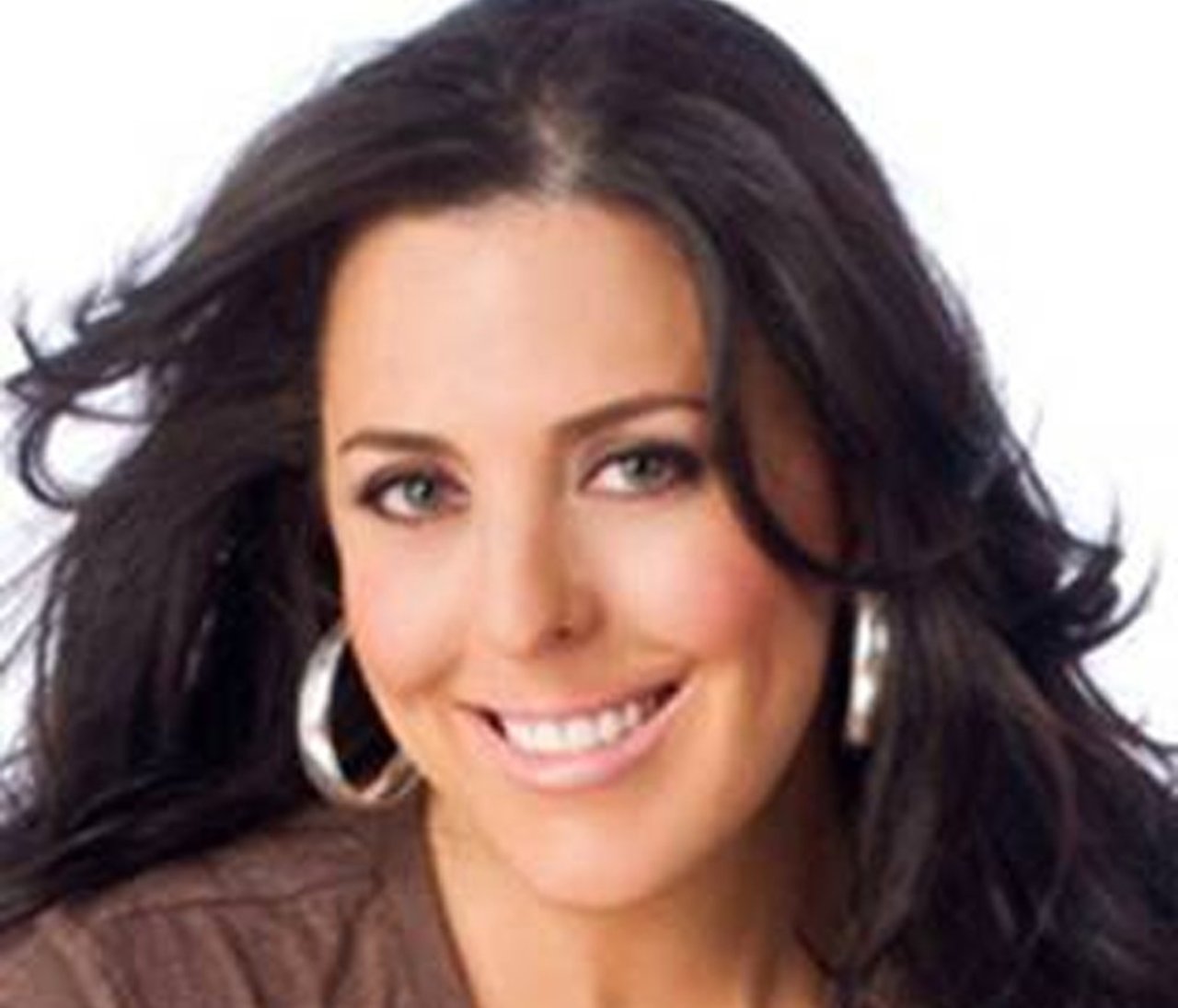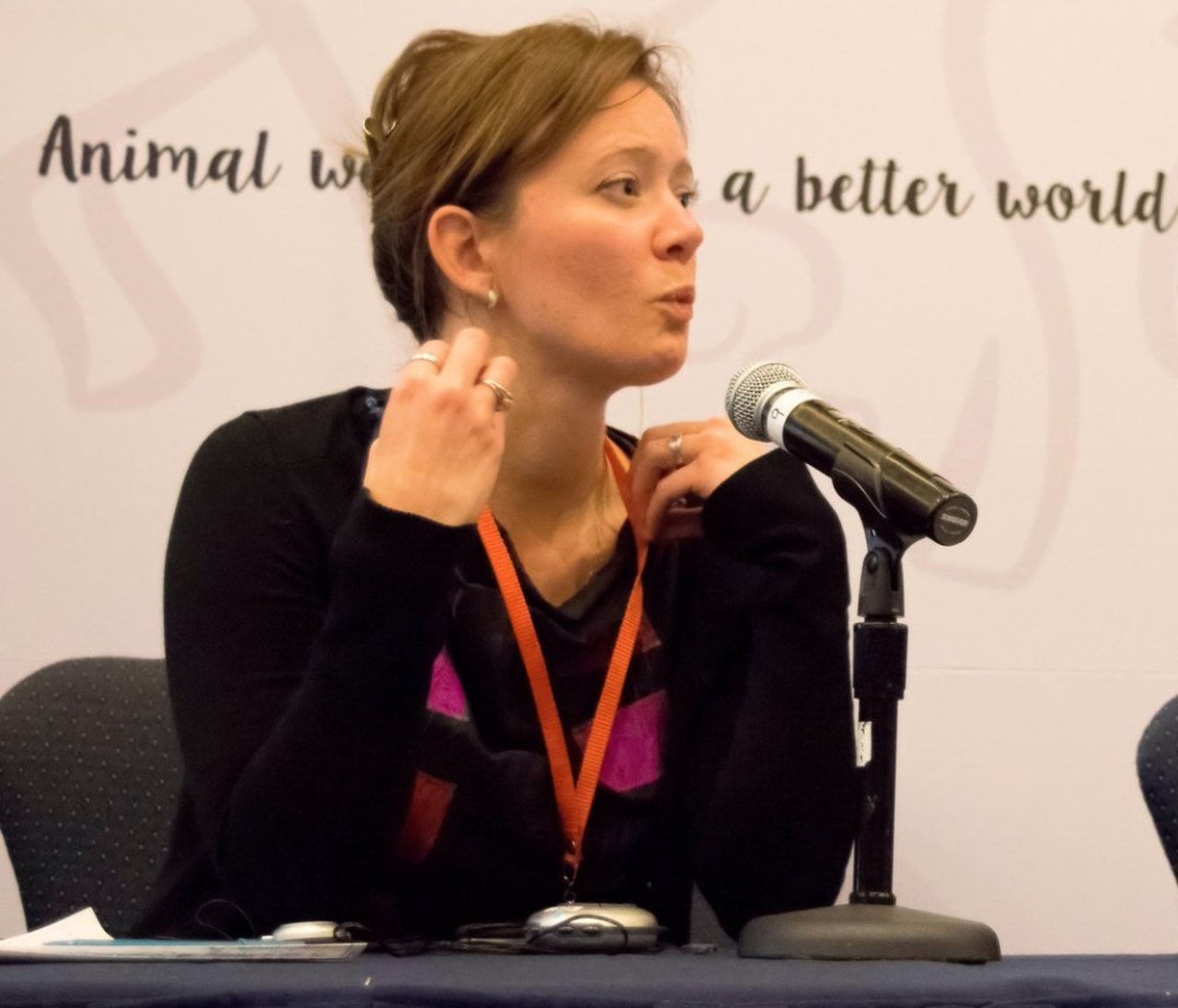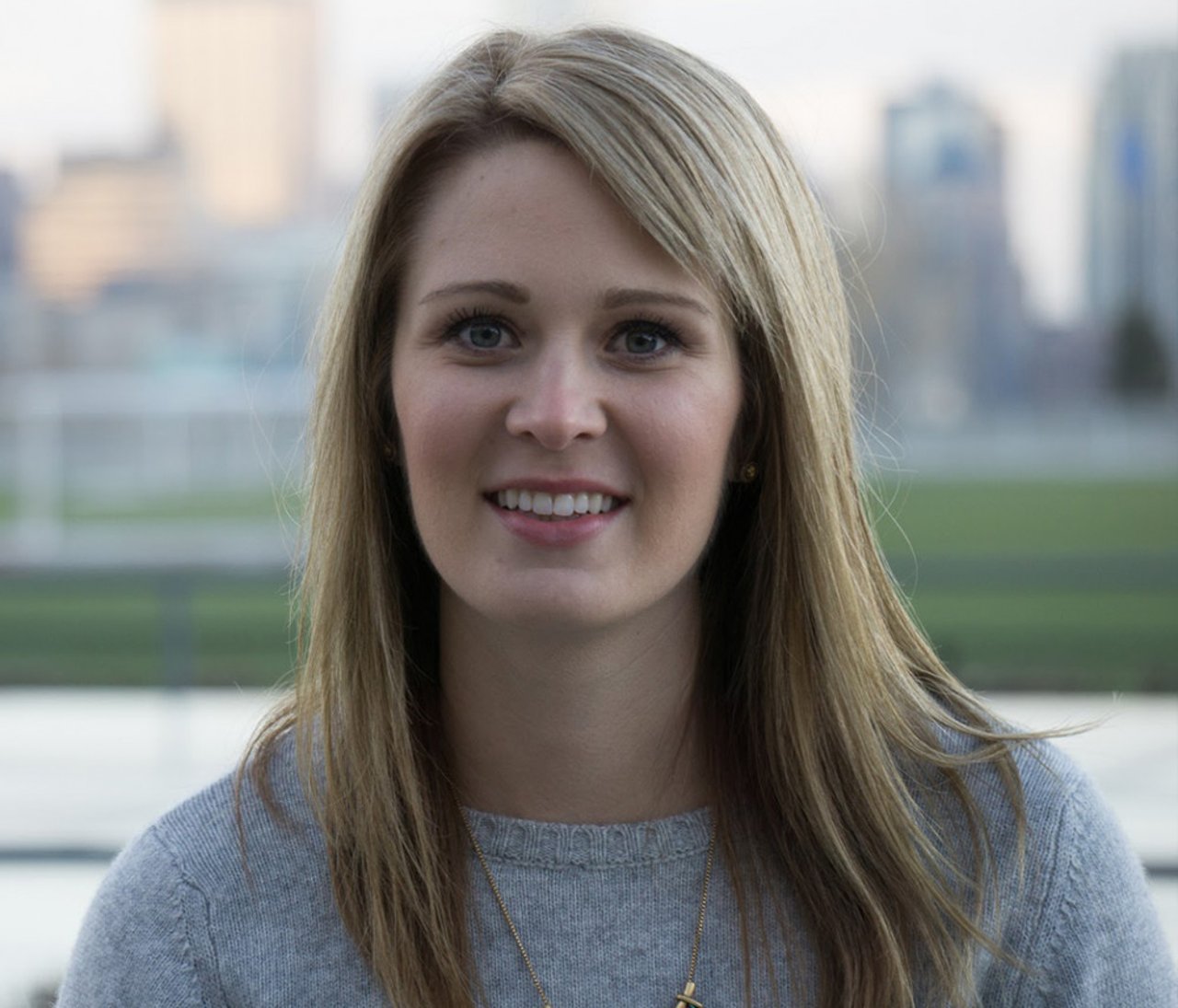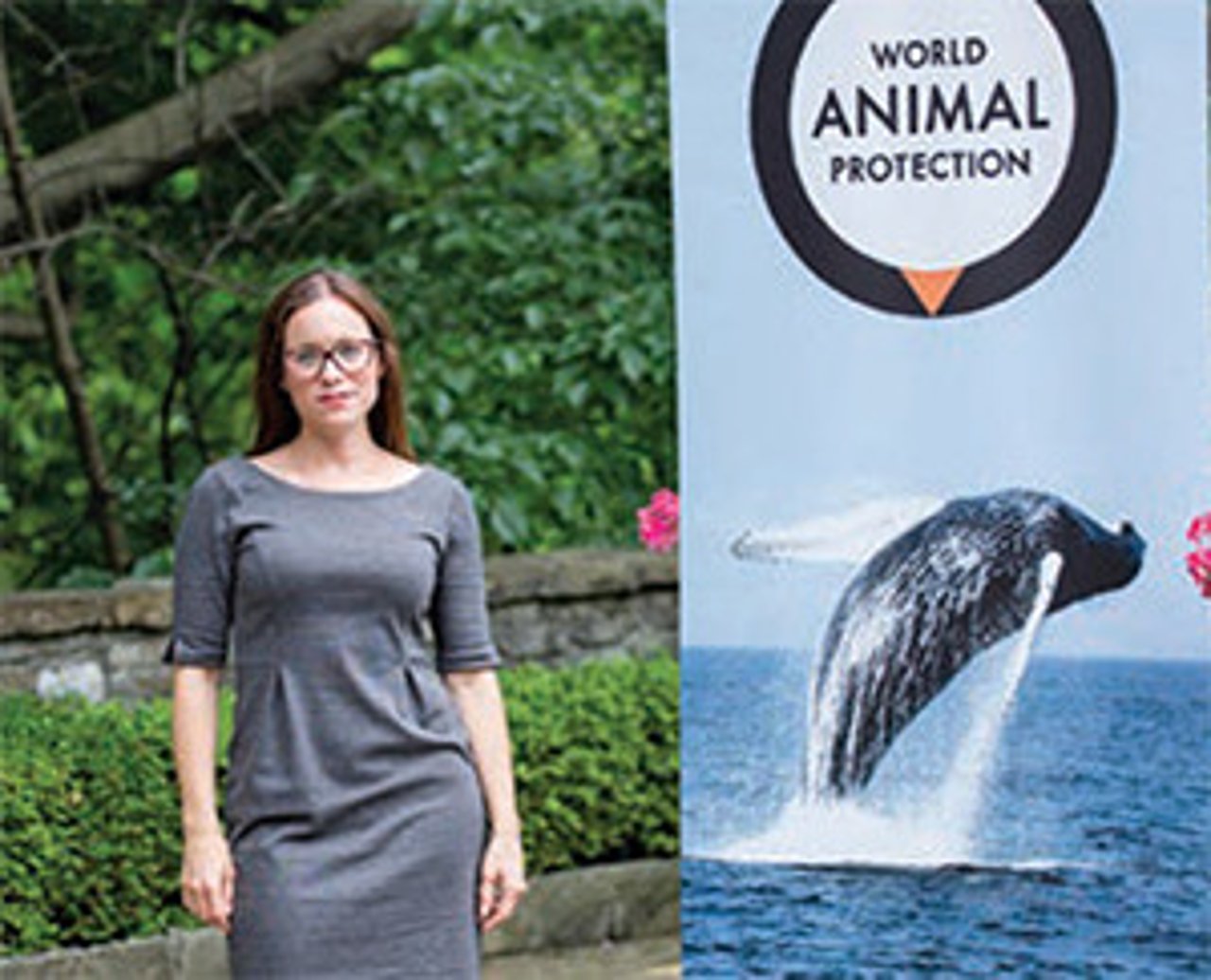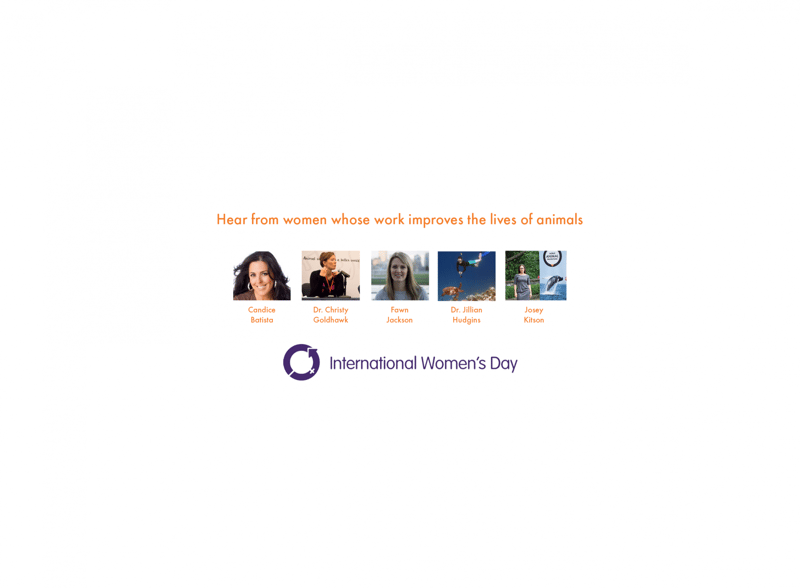
International Women's Day: Hear from women whose work improve the lives of animals
News
Candice Batista, Dr. Christy Goldhawk, Fawn Jackson, Dr. Jillian Hudgins, and Josey Kitson share insights behind their work as it relates to animal welfare
*Note: While job titles and roles may have changed, we continue to applaud and celebrate the work of these five inspiring women.*
In celebration of International Women’s Day, we are putting the spotlight on some inspiring women whose work makes a positive impact for animals.
Animals play a vital role in our lives as beloved pets, farm animals, and precious wildlife. These women exemplify the many different ways that we all can make the world a better place for animals and people alike.
Click on any of the names below to jump to their interview:
Candice Batista, Eco journalist & TV producer/creator
Dr. Christy Goldhawk, Animal Health and Welfare, Elanco Animal Health
Fawn Jackson, Executive Director, Canadian Roundtable for Sustainable Beef
Dr. Jillian Hudgins, Senior Project Scientist, Olive Ridley Project
Josey Kitson, Executive Director, World Animal Protection Canada
Eco journalist & TV producer/creator
What inspired you to have a career that helps animals?
I thinks it’s in my genes, I grew up in South Africa, and have always had a very very close connection to animals, my mom also worked at the SPCA. It’s been ingrained in me since I was a child, I could not image it any other way. Animals have no voice, they are so innocent and I feel I need to help where I can.
As a woman, are there any barriers you have faced in becoming successful in your field? How did you overcome them?
The TV business is tough business and is definitely a man’s world. But persistence and passion have been key for me.
Based on your own experience, what advice would you give to women considering pursuing a career in your field?
You really have to love it and you have to really want it! There is a lot of rejection, you have to have a thick skin, you can’t take things personally and you have to be persistent.
What has an animal (e.g. beloved pet) taught you about life?
I’ve had so many pets and they’ve all taught me something, but my beloved Gizmo, who passed recently, after being in my life for 20 years, taught me patience and what unconditional love really is. She trusted my husband and I implicitly and you could really feel that trust, that was a beautiful thing to experience. It’s also an incredible thing to share your life with another species, to understand them. To get them space, to nurture them, it’s an amazing thing.
What changes have you seen for animals over the past few years?
I think there is more awareness about the suffering of animals, thanks to social media and groups like World Animal Protection leveraging it really well. That awareness facilitates change, we’ve seen that in the cases of Sea World, Ringling Brother’s removing elephants from circuses etc. All good things, but we have a long way to go.
What do you see as the future for animal protection?
This is a tough question to answer, I’d like to say that we’ll see less animal abuse, but I am not sure this in the case, we live in a violent world and I don’t think that is going to change. But we need to continue to push change and educate people on the value of all animals. With education comes understating and that’s key for me.
Global Advisor – Animal Health and Welfare, Elanco Animal Health
What inspired you to choose a position working to help animals or with issues related to animals?
A few things that really stuck with me along my path:
A) My dad is a butcher, and I grew up hearing dad’s stories of that side of the meat industry, and his compassion for animals was so strong. He said something to me once where the punchline was around “support the animals that support our lives”… which extended waaaay beyond just animals in the food chain to those in our homes and our ecosystems.
B) I will never forget working at an animal shelter in BC, one night this homeless couple came with their German Shepard that was in severe respiratory distress and, well, headed out of his time here. I will never forget how helpless they felt, how stressed the dog was (he was dying of old age but you could tell he still wanted to comfort his owners with every last ounce of energy he had), and how I realized I really didn’t know how to help any of them besides some comfort and finding the right resource, but knew there were better ways to help. I vowed that night on the road, holding this dog and comforting his owners while we waited for a ride to the 24 hr clinic, to learn the science of helping human and non-human animals and to never be in that position again.
C) In agriculture you get to work with a lot of people that have a huge understanding and appreciation for animals and pride in their work, they just might not always say it in ways that the rest of society understands. It’s in that deep historical appreciation, commitment to being there 24/7/365, driving outcomes that balance a lot of diverse needs, and continuous learning that I can’t help but find my “why” in life to be empowered by working with and learning from these folks.
As a woman, are there any barriers you have faced in becoming successful in your field? How did you overcome them?
If you look at the “field” as applied animal welfare – the boots on the ground work – then probably the stereotype that I’m just a sensitive female and “bleeding heart” for animals, without sensibility or pragmatism. That’s come from a lot of places. Thankfully it is becoming less and less prevalent, although historically animal protection movements have been partnered with protection of women and children, so you can appreciate the connection. In hindsight, I generally appreciate that perspective…who knows what the (biased) person has experienced in the past…and then I let my work and approach speak for itself. It’s actually quite like working with non-human animals that are skeptical/anxious of you. Be patient, be kind, be understanding, be appreciative that they have their own perspective, be ready to admit faults and change when you’re wrong, and let your behaviour and the outcomes help them see that you are here to help.
Based on your own experience, what advice would you give to women considering pursuing a career in your field?
Never expect to overcome challenges/barriers by restricting the freedom of other groups. You don’t earn the ability to deliver solutions by putting other groups down. Don’t get caught up in the “us vs. them” rhetoric (be that male vs female, or binary genders vs others), remember that everyone is human and fallible with an incredible potential to improve/change...if they are given opportunity and support. Focus on delivering positive outcomes and develop a network of people for support, both ones that are like-minded and ones that will challenge you to think differently.
What do you see as the future for animal protection in your organization or in general?
In general, I see the future being more about bringing the whole picture together in a realistic way. We want to care for animals that enrich lives with food and companionship, those in our ecosystems, humans, and our environments. But solutions that focus on only one of these factors can have implications for others. Call it OneHealth or Sustainability, call it a hope that we can start coming together and appreciating the connectedness and beauty of our world. I’m hopeful that we are standing on the shoulders of giants in understanding animals and the world, starting to appreciate that at a certain level we all want a good quality of life for animals, and can overcome our differences to work together for solutions that are comprehensive of human and non-human animals, appreciative of different perspectives about animal welfare, and are pragmatic so that they can sustain or improve good welfare outcomes for years to come. Really it’s about being bold to change the current divisive nature of around welfare and other factors, for a more comprehensive and collaborative (and humane) future.
Executive Director, Canadian Roundtable for Sustainable Beef
What inspired you to choose a position working to help animals or with issues related to animals?
I grew up on a farm so taking care of and being around animals is something that has always been a part of me. I feel so fortunate that I have a career that helps support dialogues between farmers and ranchers, researchers, veterinarians, animal care organizations etc. to help advance animal care and broader sustainability with the Canadian agriculture sector.
As a woman, are there any barriers you have faced in becoming successful in your field? How did you overcome them?
I get asked quite often if it’s difficult to be a woman in a male dominated industry, I have two responses to that. First there are more women in agriculture than people would perhaps initially think and I’m excited to say this number is growing! Secondly from my experience I have found agriculture to be a very supportive and inclusive community and feel very fortunate to have a career here. I did have advice from a female mentor who helped pave the path for many women in our industry to take on roles such as sitting on boards or chairing committees; she said aim to be one of the most prepared people at the meeting and you will be equipped with both the knowledge and confidence to go far. It may seem like obvious advice but it really is good advice, for anyone! I have also found reading about the topic and challenges for women in the workplace valuable, it makes me more aware and able to proactively address some of the issues that I or other women may face. For example, women in the workplace are less likely than men to ask for a promotion or raise. Being aware of this can assist me as an employer or employee to ensure I am equally recognizing and promoting talent, even when that talent may not be asking for the recognition.
Based on your own experience, what advice would you give to women considering pursuing a career in your field?
First of all, imagine almost any career and know that you can do it within an agriculture and food setting. Secondly find a mentor or mentors. I have a number of mentors in my life, each with slightly different knowledge bases or perspectives. I have found them to be inspiring, supportive and an excellent source of knowledge. They also are people who don’t let me off the hook and challenge me to continue raising the bar. Building relationships with mentors has been one of the most rewarding investments I have made in my career both professionally and personally.
What has an animal (e.g. beloved pet) taught you about life?
Growing up on a farm there were many animals in my life, cattle, horses, cats, dogs even a few pigs. Two things I have learned from working with and being around animals that I think apply broadly to life are to be kind and to be calm.
What changes have you seen in your organization since you started working there?
The CRSB is a relatively young organization, having been established just three years ago in 2014 with the purpose of advancing the sustainability of the Canadian beef industry.
Since its inception I have seen the commitment to collaboration across multi-stakeholders grow. When we are having conversations on how to move a topic such as animal care or environmental stewardship forward people are constantly thinking about who else needs to weigh in on this conversation, how do we find a win-win situation for all of the stakeholders involved and so on. At first people were more tentative of the collaboration but we have done a lot to build trust between stakeholders who in the end really do want the same thing.
What do you see as the future for animal protection in your organization or in general?
I think we will see a higher demand for verifying outcomes of animal care, whether that is through national benchmarking or individual operation verification. I think we will also see further collaboration between animal care organizations, farmers and ranchers and other stakeholders to work on these solutions for verification and continued improvement together.
Senior Project Scientist, Olive Ridley Project
What inspired you to have a career that helps animals?
I did a BSc and a PhD in earth and planetary sciences at the University of New Brunswick. Soon after graduating from my PhD, I realized that I wanted to do something more hands on and conservation-related, so I joined a volunteer marine conservation expedition in Mexico and learned how to carry out surveys and research while SCUBA diving. Learning these skills allowed me to be hired on as staff and then find a job as a marine biologist working at a resort in the Maldives. Fellow staff members at the resort started the Olive Ridley Project in response to the number of entangled turtles we were finding. We decided to work towards a solution to prevent ghost gear and increase awareness about sea turtle, and marine ecosystem, conservation.
Based on your own experience, what advice would you give to women considering pursuing a career in your field?
1) Follow your passion - however, that may mean that you have to volunteer or work as an intern for some time to gain skills and experience.
2) Travel - it will open your eyes to situations, good and bad, that you hadn't realized even existed. These can spark ideas and creativity, meeting new people will increase your job prospects, and you will gain new skills and experiences along the way.
3) If there's not an organization out there that is focused on what you want to work on or conserve then start one!
What do you see as the future for animal protection in your organization?
I'm excited for the future of the Olive Ridley Project as we have recently started expanding our team and our reach. We grew from a staff of 2 to a staff of 6 this year and we have people based in both the Maldives and now Pakistan and we have recently opened a Turtle Rescue Centre staffed by a veterinarian. We have started looking recycling options as well, working with the women of a Pakistani community to turn ghost gear into jewlery, art, embroider with it, etc. to generate income for their community. I feel like over the last three years, we have made a difference in the Indian Ocean: our volunteers have pulled over 600 net conglomerates out of the ocean and rescued over 350 turtles from entanglement. We hope to continue to spread the message of conservation and ghost gear prevention around the Indian Ocean.
Executive Director, World Animal Protection Canada
What inspired you to choose a position working to help animals or with issues related to animals?
I’ve always been passionate about protecting animals. From having rescued pets as a child, to working at a vet clinic in my teens, to interning at two animal protection organizations in my 20s - animals have always been a strong driving factor in my life.
As a woman, are there any barriers you have faced in becoming successful in your field? How did you overcome them?
Luckily no. Both the animal protection sector and more general charitable sector are filled with positive, supportive men and women. I feel very, very lucky to be working in this sector.
Based on your own experience, what advice would you give to women considering pursuing a career in your field?
Volunteer. My first jobs in animal protection were as an intern – with World Animal Protection (then WSPA) and Zoocheck Canada. I learned a lot and made many connections. It’s a small sector so it’s important that you stay in touch with the people that you meet and keep getting involved. It might take some time and it will pay off.
What has an animal (e.g. beloved pet) taught you about life?
Never give up. For a time I rescued senior, special needs dogs. These dogs were abandoned during their greatest time of need. It broke my heart that someone gave up on them. Through surgeries and illnesses and chronic diseases those dogs never gave up – I really loved being able to help them keep going through their final years.
What changes have you seen in your organization since you started working there?
Too many to count! I’ve learned so much from the changes that World Animal Protection has gone through. Every year we become a stronger organization more capable of bringing about change at scale for animals. I can’t wait to see what the future holds.
What do you see as the future for animal protection in your organization or in general?
Animal protection is really starting to move into society’s mainstream thinking. It’s no longer “fringe”. The momentum has been building over the past 15 years I’ve worked in the sector. It’s incredibly exciting for animals. I’m confident that big changes are coming – it’s incredibly exciting for animals!
